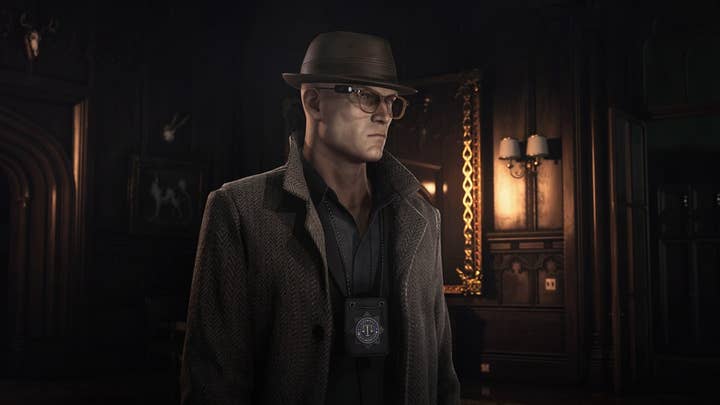Hitman 3 | Critical Consensus
Critics applaud the end of IO Interactive's superlative trilogy, cementing Hitman's status as one of gaming's most distinctive franchises
If we're being brutally honest, the Hitman franchise has never quite lived up to its commercial potential. Starting in 2000 with Hitman: Codename 47, the series has always been admired by critics and game designers, but 20 years and seven different games never brought the breakout hit that often seemed to be just around the corner. IO Interactive managed to inspire a Hollywood movie, but it seldom exceeded its sales targets with any given release.
Indeed, with Hitman: Absolution in 2012, it fell a good way short of publisher Square Enix's commercial expectations. A few months later, IO announced it would be cutting half of its workforce and cancelling several projects, with a pledge to focus entirely on Hitman going forward. While fans of the series were delighted to hear that Agent 47 hadn't completed his last contract, these appeared to be troubling times for the Danish studio -- on the ropes, with no choice but to cling to the very franchise that had just publicly faltered.
The next entry in the series allowed those fans to breathe a huge sigh of relief. The plain-spoken title, Hitman, reflected a clear desire to return to the series' core identity after the uneven, story-driven approach of Absolution. The structure, on the other hand, was quietly brilliant; a "season" of content in which the game's famous puzzle-box missions were episodes, with live-service elements keeping players engaged in-between. Back in 2016, the plan was to have multiple seasons in this bold structure, but IO split from Square Enix in 2017 and switched to Warner Bros. Interactive for Hitman 2, which released the new missions in a more conventional boxed package.
"It feels very, very familiar -- even more than the leap from 2016's Hitman to 2018's Hitman 2"
Ars Technica
Hitman 3, which launches today, is the third game in that trilogy. Like the second, it eschews the episodic, TV-season structure from 2016 for a more familiar package, but the critical reaction indicates that IO is following the same plan it laid out back then. Indeed, Ars Technica's Sam Machkovech offered one of a small handful of middling reviews on the basis that Hitman 3 feels more like an expansion pack than a full sequel -- or, perhaps, the third season of episodes that were not originally intended to launch as standalone games.
"It feels very, very familiar -- even more than the leap from 2016's Hitman to 2018's Hitman 2," Machkovech said. "It lands in a nearly identical interface as the last game, with the same XP progression meters, the same objective-based system, the same one-off 'escalation' missions, and the same 'custom contracts' sandbox. And its graphics engine revolves around a seemingly identical core, with one admittedly handsome tweak.
"The worst part about Hitman 3, then, is the number in the title. It betrays the game's true nature as an expansion pack instead of a standalone game that can easily be enjoyed in isolation. That's not a bad thing! If all you want are 'more Hitman reboot levels that are up to the series' par of excellence' (and that was the game's original 'episodic' plan), then [Hitman 3] will neatly lodge into your brain."

With a Metacritic average of 88 at the time of writing, Hitman 3 is the best reviewed game in the series to date. While there is a smattering of dissenting voices, the vast majority of critics agree that IO's skill for creating atmospheric, intricate environments with myriad solutions to every problem, remains undiluted. PC Gamer's Andy Kelly argued that three of the six missions in Hitman 3 are high-points for the series' entire 20 year run -- and one, in particular, is the studio's "masterpiece."
"Although Hitman 3 builds on the solid foundations laid by the first two parts of the trilogy, sharing the same AI, stealth systems, and user interface, IO has also taken this opportunity to experiment a little with its tried and tested formula," Kelly said. "The complex, open-ended Berlin level is the most the studio has ever trusted a Hitman player to take the lead and figure things out for themselves.
"...At its core this is still very much a classic Hitman game, but in many ways a more playful, experimental one. One level set in a dusty old mansion in Dartmoor, England sees Agent 47 posing as a private detective and solving a murder mystery straight out of an Agatha Christie novel. It's a gimmick, but a fun, unique spin on what is otherwise a fairly typical assassination mission.
"No one makes places quite like IO Interactive, and in Hitman 3 you'll find some of the developer's finest creations to date"
PC Gamer
"The mansion itself is brilliantly constructed. Long, dark corridors lined with oil paintings open up into bright, lavishly decorated drawing rooms. And behind the walls there's a labyrinth of secret passages to discover with peepholes for spying on people. There's also a wonderful feeling of isolation, with the house standing alone in an expanse of barren, overcast moorland that stretches infinitely into the distance. No one makes places quite like IO Interactive, and in Hitman 3 you'll find some of the developer's finest creations to date."
While Kelly's opinion is broadly representative of the consensus, the negativity that does exist around Hitman 3 is aimed at the greater importance of the series' underlying narrative. Lest we forget, Absolution was criticised for its more linear, story-driven approach, and while these elements do not appear to be as prominent in Hitman 3, it is enough to provoke a strong response from certain critics. Vice Games' Cameron Kunzelman, for example, made the not-unreasonable argument that Hitman's appeal is "because of its simplicity."
"These two games [Hitman and Hitman 2] were about taking the simplicity of the Hitman concept and building more and more scaffolding around it, giving you more ways to create novel situations without obscuring the core mission," he said.
"I'm sorry to say that I think Hitman 3 has somehow managed to mess this up. Hitman 3 goes astray because it seems to have forgotten the core mission and doubled down on building out all these extra parts, bending the entirety of the game around the conceptual 'World of Assassination' plotline that has stretched through this trilogy of games.

"In the previous games, the narrative set the bounds for what kind of locations you traveled to and provided a throughline of rationale for them. The narrative was not the first thing in the priorities. In Hitman 3, the tail is wagging the dog; the plot of the Hitman games is driving this entire operation, and the whole thing is worse off for it."
On this point, your mileage may vary. Hitman is still going after 20 years precisely because it has the sort of dedicated audience that contains purists -- those who feel the series was at its best in Blood Money and the 2016 reboot, where the story was just window-dressing for elaborately designed missions that could be enjoyed as standalone experiences. However, while that is a reasonable position, it is no more reasonable than IO's desire to tie up its various narrative threads as the trilogy draws to a close. Not every critic appreciates this side of Hitman, but plenty have been taken by surprise.
"The World of Assassination trilogy is hands-down one of the best and most complete-feeling trilogies in video game history"
VG247
"Hitman 3 made me care more about its plot than crafting the perfect murder," Kotaku's Riley MacLeod noted. "The narrative, which I usually see as a flimsy excuse to play dress-up and cause globe-spanning mayhem, bleeds into the structure of its levels and creates some unexpected moments of emotion and vulnerability. Its dark story plays with the lie at the heart of Hitman's gameplay: Agent 47 can easily slip into the life of a waiter, or a musician, or a model, but who is he really, and who, if anyone, does he want to be?
"...Developers at IO Interactive have called Hitman 3 the end of the modern trilogy, and as such, they seem to face these contradictions of the series head on in this game, stripping away characters' justifications and forcing them to take an honest look at themselves and their actions. For a lot of the game, I didn't lose myself in a Hitman fantasy of parties, mastery, and bloodshed. I felt distinctly like I was playing as Agent 47, with all the pain and darkness someone who lives in a world of murder would inevitably bring crashing down on themselves."
Indeed, this may be Hitman 3's most distinctive achievement. It may have some of IO's best mission design, but they are great in a similar way to Hitman missions in previous games. However, the series has never quite struck an ideal balance between those missions and the plot that carries Agent 47 from one to the next; with the last game in its modern Hitman trilogy, IO may have finally delivered the best of both worlds.
"The silly sandbox stuff is still there," said VG247's Alex Donaldson. "Hitman takes great glee in its dark humor, be that in 47's deadpan dialogue or in costumes he can don and weapons he can use -- but between and during missions, the narrative runs more fluidly. Where before it felt like more of a wrapper, now it feels deeply baked into Hitman 3's identity. For the first time in this trilogy, the overarching story beyond the little tales in each individual level gripped me. I consider that a big win.
"...I know some elements of this will inevitably get a mixed reception from fans. The most linear level, in particular, is likely to get some flak. But, honestly, I don't mind. That mission is built the way it is as a direct result of the way Hitman 3's story is structured. The level is designed to be a more simplistic sort of catharsis. At that it is successful. Further, Hitman 3 is the conclusion of a trilogy that already provides a raft of excellent sandboxes for players to experience -- and of course, those levels can carry forward to live 'inside' the Hitman 3 package, should you own previous games.
"Taken individually, Hitman 3 feels like great value, with plenty of variety and lots to do. When taken as a whole, the World of Assassination trilogy is hands-down one of the best and most complete-feeling trilogies in video game history."

